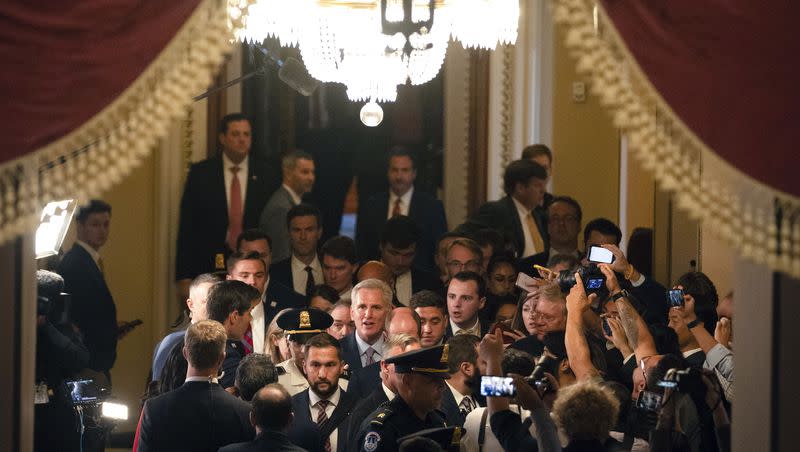Chaos in the U.S. House: The sorry state of congressional governance

- Oops!Something went wrong.Please try again later.
- Oops!Something went wrong.Please try again later.
Anyone watching the news recently has witnessed a terrible display of political acrimony that is an embarrassment to this country. We are not describing Republican versus Democrat but the Republican versus Republican fratricide resulting from the near shutdown of the federal government and the ousting of U.S. House Speaker Kevin McCarthy. This tumult is generating conjecture about the health of the GOP nationally and highlighting recent initiatives to alter local politics. We offer our observations.
Anyone watching cable news programs or social media the last several days has been amused, but more likely appalled, by the antics of a handful of Republican members of Congress and the ensuing tumult and confusion. Democrats watched and allowed the carnage to occur. Is this the disintegration of the Republican Party?
Pignanelli: “If the present Congress errs in too much talking, how can it be otherwise in a body to which the people send one hundred and fifty lawyers, whose trade it is to question everything, yield nothing, and talk by the hour?” — Thomas Jefferson
Dozens of reality TV programs entertain millions with “impromptu coverage” of fights between families and friends. Usually, these differences are minor, but the camera incentivizes participants to amplify the emotions. Americans are now viewing a congressional version of such theater.
The main combatants — McCarthy and Rep. Matt Gaetz, R-Fla. — are both aligned with Donald Trump. Allegiance to the former president is not at issue. Other factors are at play.
For over a decade, the demographics of both parties shifted, which created confusion and frustration among their ranks. Trump made it fashionable to challenge traditional Republican leadership without incurring ramifications. Additionally, promises by veteran leaders to control the deficits only prompted laughter and contempt from younger GOP officials. Thus, internal rebellions in Congress are not surprising.
The national Republican Party has weathered much greater challenges (i.e. Great Depression, Watergate, Great Recession), and will remain strong. But they will likely endure comedic comparisons to the Kardashians, “Real Housewives,” etc.
Related
Utah congressmen express anger after Speaker McCarthy ousted
Opinion: Call it ‘a victory for the forces of chaos within the Republican Party’
Webb: The Republican Party has always had factions and, even today, it’s not on the verge of self-destruction, at least in most of the country. However, some members of Congress take dissension within the party to whole new levels, forming a circular firing squad and contributing to the embarrassing dysfunction of Congress. This is proof that Washington is broken.
In the big picture, it’s critical to remember that Republicans narrowly control the House, while Democrats control the presidency and the U.S. Senate. If anything worthwhile is accomplished in Congress, it requires compromise, support from both Republicans and Democrats. McCarthy was ousted by a small faction of right-wing ideologues for the unforgivable sin of compromising a little bit with Democrats to keep the government running.
In part, GOP schisms are more prevalent today because the apparent leader of the party, Donald Trump, is so polarizing himself.
It is worthwhile to contrast the chaos in Congress with what the nation’s 50 governors are doing. Under the leadership of their chair, Utah Gov. Spencer Cox, they have undertaken a major initiative to produce better policy through “healthy conflict” and by “disagreeing better.” They have adopted a “positive approach to political and social discourse.” And states, with a few exceptions, are better governed than the federal government.
Local businessman Bruce Cummings along with others have developed a nonprofit organization “People4Utah” to open the closed Republican primary elections in Utah. This organization believes that restricting participation in party nomination activities marginalizes most citizens, and is unhealthy for democracy. Do local Republicans need such a change?
Pignanelli: Republican leaders demand with compelling logic that only the party faithful should choose their nominees in the primary elections. But this reasoning also raises the important question of why taxpayers should pay for elections in which they cannot participate. (Utah’s second largest voting bloc is unaffiliated.)
Despite allegations of mischief, surveys indicate most Utahns vote for whom they consider the best person, including in the primaries. Such rational behavior oftentimes excludes the most conservative or liberal candidates, with selections toward better candidates to represent constituents. Therefore, I respectfully suggest if taxpayers are paying the freight, they can ride the train.
Webb: I’m in favor of as much participation in the political process by as many citizens as possible. I was among those who supported opening the party nomination process to allow candidates to gather signatures to get on the ballot. I also support open primary elections if parties voluntarily choose that route.
However, I think we would go too far in forcing the Republican Party to allow non-Republicans to vote in its primary elections. If someone wants to vote in a Republican primary, it’s easy enough to join the party.
Is there a potential for such disruptions among Democrats nationally or locally?
Pignanelli: Far left progressives prevailed throughout the internal struggles of the Democratic Party in prior decades. Their control was secured by subdued, effective bloodletting of moderates outside the limelight.
Webb: Democrats have their own schisms. But at this time in history, Democrats are much more unified, both nationally and in Utah.
Republican LaVarr Webb is a former journalist and a semiretired small farmer and political consultant. Email: lwebb@exoro.com. Frank Pignanelli is a Salt Lake attorney, lobbyist and political adviser who served as a Democrat in the Utah state Legislature. Email: frankp@xmission.com.

